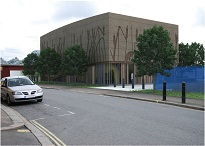MP Accuses Mayor of "Obvious Deception" over Super Sewer Site
Document contradicts Boris' words of support for Fulham campaigners
A new row has broken out over the proposed "super sewer" site in Fulham, with Hammersmith MP Andy Slaughter accusing London Mayor Boris Johnson of an "obvious deception".
Groups of local residents have protested for months against Thames Water's proposal to build a main access shaft to the Thames Tunnel, or super sewer as it is nicknamed, on a site in Carnwath Road on Fulham's riverside.
At a public meeting in Hammersmith on March 7, Boris Johnson said that he supported their fight against Thames Water's plans, and promised he would defend their interests, saying: " I will not tolerate anything that disrupts and destroys the lives of London communities."
However, Freedom of Information requests by Andy Slaughter show that the Mayor said just the opposite one month earlier.
In his official response to Thames Water's Phase Two Consultation, dated February 7, Mr Johnson gave his support to the water company's plan to shift the location of the access site from Barn Elms on the south side of the river to Carnwath Road, on the grounds that Carnwath Road is a partially derelict brownfield site.
Mr Slaughter has now written a letter to the Mayor asking him to clarify his position. He says: " Mr Johnson expected his submission to Thames Water supporting the switch from Barn Elms to Carnwath Road in Fulham to be kept secret until after the Mayoral election in May."
He adds: " This led Johnson to send a letter to Thames Water appearing to make a further U-turn. The letter, dated March 27 but not yet received by Thames Water, raises concerns about a number of Tunnel sites, where these have proved publicly unpopular, but does not withdraw the original submission and is six weeks outside the consultation period.
" The Mayor was caught out saying one thing in public and another in private, and is now trying to wriggle out of an obvious deception for political advantage. It is difficult to see how he can be trusted on any major planning issues."
Andy Slaughter also says this is not the only example of the Mayor saying the opposite in public to his private views. In his letter to Mr Johnson, he also sets out how Johnson approved the demolition of local businesses in Shepherds Bush protesting about development proposals for Shepherd's Bush Market while promising in public to protect them.
As well as his response in February to Thames Water's consultation, Mayor Johnson is also actively engaged with the Port of London Authority in supporting the "‘safeguarding" of riverside wharves from redevelopment into non-port use. These include Hurlingham Wharf, which forms part of the Carnwath Road site, and which is one of three London wharves which the Mayor and the PLA want to see "reactivated" and brought back into industrial use.
As we reported earlier, this means the Mayor is also at odds with Hammersmith and Fulham Council, who want to see the Carnwath Road site, currently being rented out for open storage purposes, being redeveloped for residential use.
In a further twist, the Mayor now seems to be shifting his stance once again, ignoring his past statements and questioning the entire Thames Tunnel project, which he has supported up till now. A spokesman said: " A spokesman said: "Boris Johnson has always been keen to clean up the Thames and recognises how large infrastructure projects help create jobs. But there is now mounting concern about the spiralling costs and the severe disruption for many people in some parts of London which is clearly worse than what was initially anticipated.
"He has made clear that he will not tolerate disruption and will defend Carnwath Road and reject any damage to the quality of life of residents in Fulham.
"Mr Johnson has therefore written to Caroline Spelman asking for a swift stock take of the Thames Tunnel, asking her to appoint a suitable independent expert to assess where we are and make sensible and sensitive recommendations on how to proceed. We may need to re-think the whole scheme."
The proposed site, to the west of Wandsworth Bridge, collectively called Carnwath Road Riverside by Thames Water incorporates Carnwath Road Industrial Estate and Whiffin and Hurlingham Wharves.
Construction on the site would take around six years and would result in an industrial building as well as the access shaft beneath. Thames Water has produced an image of what the building might look like.

Hammersmith and Fulham Council's plans for the site, as outlined in its South Fulham Riverside draft supplementary planning document are for different redevelopment plans, which it says would transform the area from its industrial past into a new residential mixed-use area.
These plans, which it says received overwhelming support from residents at recent workshops coordinated by the Prince’s Foundation, include the construction of at least 2,200 new homes, plus shops, community facilities, public spaces and the opening up of the river for water based uses.
This month the council has launched a second public consultation, asking local people to give their views on the future of Fulham's riverside if Thames Water's plans were rejected. It also says it is considering mounting a legal challenge on the plans.
This however, would mean the Tory run council would continues to be at odds with the Government, which recently took action to override it over the Carnwath Road site.
The council says a Government official, representing the Secretary of State for Communities and Local Government (DCLG), wrote to the council in February to say: "Without specific authorisation from DCLG, your authority cannot grant planning permission, or enter into any agreement or other arrangements, or pass any resolution, in connection with the possible grant of planning permission".
The council reacted angrily to the letter, saying it appears to to pave the way for the site to be used by Thames Water as a construction site.
A Communities and Local Government spokesman explained: " The Government considers the Thames Tunnel to be a nationally significant infrastructure project and our decisive action now reduces the chance of delay and the possibility of escalating costs from sites being lost that may potentially be needed for building this project."
April 13, 2012
